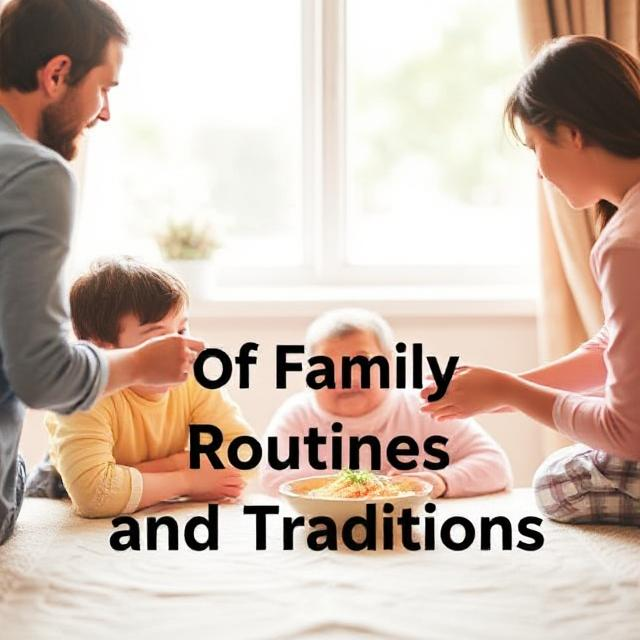The Importance Of Family Routines And Traditions
Family routines and traditions play a crucial role in the emotional, psychological, and social development of children. They provide stability, foster bonding, and create a sense of belonging. These shared experiences help create a positive family dynamic and can strengthen relationships over time. While routines offer structure and predictability, traditions offer opportunities for connection and memory-making.
Here are several reasons why family routines and traditions are so important:
1. Creates Stability and Predictability
Children thrive in environments where they know what to expect. Family routines—such as regular mealtimes, bedtime rituals, or weekend activities—offer a predictable structure that helps children feel secure and safe.
-
Routines reduce anxiety: When children know that certain things will happen at specific times (like a bedtime story every night), it helps them feel more in control and reduces feelings of anxiety.
-
Consistency promotes emotional stability: Predictable routines offer a consistent framework for behavior, which can lead to emotional security, as children know the structure within which they can operate.
2. Fosters Stronger Family Connections
Routines and traditions encourage quality family time, helping to strengthen the bond between parents and children. These shared experiences give families the opportunity to connect in meaningful ways.
-
Spending time together builds trust: Whether it’s having dinner together every evening or a weekly movie night, these regular moments allow family members to interact and engage with each other, building trust and communication.
-
Quality over quantity: Routines help make the most of the time spent together. Even a short daily ritual, like reading together before bed, can make a significant difference in maintaining close relationships.
3. Instills Values and Traditions
Family traditions, whether for holidays, birthdays, or simple weekly events, create opportunities for families to instill values in their children. Through these traditions, children learn what is important to the family, and these values can shape their behavior and beliefs.
-
Teach family culture and values: For instance, family rituals around religious holidays, cultural celebrations, or volunteer activities can pass down important values, like gratitude, kindness, and the importance of giving back.
-
Create a sense of belonging: Traditions remind children of their roots and identity, reinforcing their connection to their family’s history, culture, and community.
4. Promotes Positive Behavior and Routine
Routines help children develop good habits, structure, and responsibility. When children are consistently expected to do certain tasks, like putting away their toys or doing homework at a specific time, they learn how to manage their responsibilities.
-
Teaches responsibility: When children understand their role in family routines (such as helping set the table or feeding the pet), they develop a sense of responsibility and teamwork.
-
Fosters independence: By following routines, children learn time management, which can help them become more independent as they get older and handle their own schedules.
5. Encourages Family Bonding Through Shared Experiences
Traditions create opportunities for special, fun, and meaningful experiences that can be looked forward to year after year. These moments become cherished memories that children carry with them throughout their lives.
-
Create lasting memories: Family traditions like baking cookies during the holidays or taking a yearly family vacation provide experiences that children will remember fondly and look forward to as they grow older.
-
Strengthens family identity: Traditions help families define who they are. The activities they regularly engage in become part of the family’s unique identity and contribute to a sense of belonging for everyone involved.
6. Enhances Emotional Well-being
Knowing there’s a consistent routine in their daily lives and experiencing family traditions can have a profound impact on a child’s emotional health.
-
Encourages emotional regulation: Consistent routines, especially those that include time for self-care (such as a relaxing bedtime ritual), help children feel more balanced and better able to regulate their emotions.
-
Creates a sense of comfort and security: Regular family interactions, whether through shared meals, game nights, or outdoor activities, help children feel loved, accepted, and secure in their relationships with family members.
7. Teaches the Importance of Work-Life Balance
Family routines and traditions help children understand the value of balancing responsibilities with relaxation and fun. This can influence their future approach to balancing work, school, and personal life.
-
Incorporates relaxation and fun: It’s important to have time built into the family routine for fun activities, like playing games or taking walks, which give everyone a break from their busy schedules.
-
Demonstrates time management: Seeing parents balance work, household chores, and family time can help children learn how to manage their own time and prioritize their commitments.
8. Strengthens Family Support Systems
Routines and traditions help build a network of emotional support within the family. Children know they can rely on their family members to be there for them, whether it’s during difficult times or during celebrations.
-
Creates a support system: Knowing that there’s always someone in their corner—whether it’s to help with homework or celebrate achievements—helps children feel more secure and supported.
-
Encourages emotional expression: Regular family time provides a space where children feel comfortable expressing their emotions, knowing they will be listened to and cared for.
9. Promotes Mental and Physical Health
Having structured family routines can promote a healthy lifestyle, which includes time for physical activity, sleep, healthy eating, and mental well-being.
-
Encourages healthy habits: Regular meal times, outdoor activities, and sleep routines contribute to children’s overall physical health. Family routines can also create an environment that encourages healthy habits, like exercising together or cooking meals at home.
-
Promotes better sleep: Routines, especially bedtime rituals, help establish healthy sleep patterns, which are crucial for a child’s physical and cognitive development.
10. Helps Manage Stress and Transitions
Family routines can be particularly helpful in managing stress, especially during major life transitions such as moving to a new home, starting school, or dealing with a family illness.
-
Provides comfort during transitions: During times of change, maintaining familiar routines can help ease anxiety and offer children a sense of continuity.
-
Offers a sense of control: In uncertain situations, children feel more in control when they can rely on familiar routines, even if other aspects of their lives are changing.
Tips for Creating and Maintaining Family Routines and Traditions:
-
Start small: Begin with a few simple routines, such as having dinner together or reading before bed, and build from there.
-
Involve everyone: Get the whole family involved in creating and maintaining routines and traditions, so everyone feels a sense of ownership.
-
Make it enjoyable: Traditions should be fun and engaging for all family members. For example, a weekly pizza night can become a family favorite.
-
Stay flexible: Life can be unpredictable, and sometimes routines need to be adjusted. Be flexible and adaptable, especially during holidays or travel.
-
Celebrate traditions: Make sure to celebrate and appreciate traditions. Take photos, create keepsakes, or simply talk about why the tradition is meaningful to your family.



